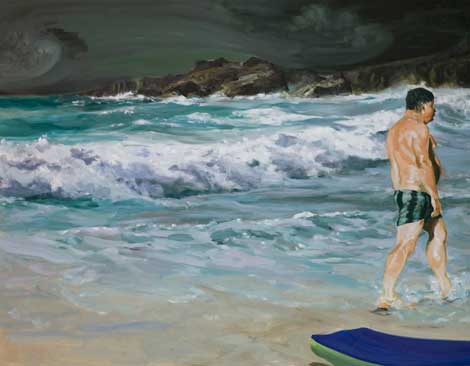Rising to prominence in New York in the 1980s, Eric
Fischl’s dramatically composed, challenging works portrayed a steamy, unwholesome underbelly to suburbia—a vision of the nation’s great middle class as throbbing, voyeuristic adolescents, impassive temptresses and tumescent patriarchs. “Dive Deep: Eric Fischl and the Process of Painting” explored the artist’s oeuvre from the perspective of motivation and process. In addition to a number of striking, massively-scaled paintings, the exhibition included smaller works, preparatory sketches and photographs, as well as large-scale drawings and a handful of remarkable small bronze sculptures.
In Untitled (Poolside) (1979), a large charcoal drawing on three sheets of paper, a youth at a patio table stares open-mouthed at a mature nude woman, her legs astride a chaise longue, while a bespectacled male figure floats ineffectually in the adjacent pool. The illicit gaze is a recurring device that Fischl employs in his seminal Bad Boy (1981), not on view, and in numerous other works.
Saturday Night (The Aftermath Bath) (1980), executed in oil on glassine, conveys his keen enjoyment of mark-making, of the feel of the brush. The transparency of the glassine offered Fischl the opportunity to play with composition, overlaying figures, chairs and other objects and moving them around—as he would later do in Photoshop.
Fischl cites his earliest influences as movies, television and magazines. Always capturing that “awkward moment,” photographic source material abounds in the exhibition, ranging from images the artist snapped on the beaches of St. Tropez to Thomas Eakins of naked boys swimming. Photography, he says, “slices the world so thinly… everyone is off balance.”
A tour de force, Scenes from Late Paradise: The Stupidity (2006-7) portrays a heavyset man in striped swim trunks wading in the edge of the surf; dark waves and clouds churn in the distance. Deft, muscular strokes describe bulging flesh and crashing foam. Scenes from Late Paradise: The Parade (2006-7) has a staged quality. Morally ambiguous, Fischl observes these beach-goers with wry detachment.
In “The Krefeld Project” series, Fischl skirts the terrain of theater, with hired actors serving as models in a rented Mies van der Rohe house, creating scenes that pose unanswerable questions about the nature of their relationship. Krefeld Redux Bedroom Scene #5 (The Earth Rolls Over You) (2004) presents the bloated, pasty figure of a man striped with shadows from billowing canopy. A female figure below is reduced to knobby feet and knees, hair and a hand gripping a pillow.
Fischl continues to find that the act of transformation from pixel to pigment is one of utmost significance. His latest work, focused on portraiture, lacks some of the emotional density of his psychosexual dramas, yet remains strong and comes from a belief in the authenticity of gesture and the painterly process. His position in the art world may have slipped from the heady days of the ’80s, a fact he bemoans in his recent autobiography, Bad Boy: My Life On and Off the Canvas (2013); his work, however, reveals a depth and maturation reflective of a serious and complex artist.


